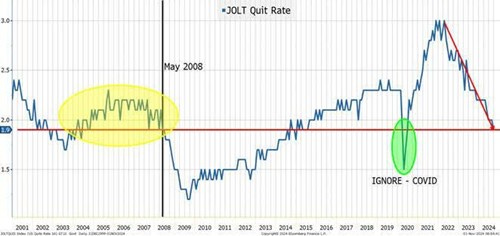The U.S. Job Market Is Contracting
Strangely false employment reports of past months, now corrected, show that the current slow growth is in fact a contraction, and that native-born Americans have lost tens of thousands of jobs.
With voters consistently stating that the economy has been their top concern throughout this year’s election campaign, economic news looms large as voting day approaches. Friday’s disappointing jobs report provides support for the Trump campaign and hurts Harris’s case.
The Center Square reports:
The U.S. economy added 12,000 jobs in October, far fewer than expected and the lowest monthly total since December 2020.
With the election just days away, it’s unclear how Friday’s report from the U.S. Bureau of Labor will impact voting.
“Total nonfarm payroll employment was essentially unchanged in October (+12,000), and the unemployment rate was unchanged at 4.1 percent,” the bureau said. “Employment continued to trend up in health care and government. Temporary help services lost jobs. Employment declined in manufacturing due to strike activity.”
This is unambiguously bad news for American workers. “US hiring advanced at the slowest pace since 2020,” Bloomberg reports. That was the pandemic year, of course, when the nation plunged into a depression and recovered, all in record time. That is obviously not a good comparison to call to people’s minds.
Unemployment rose slightly, 4.145 percent in October versus 4.051 percent in September, about a tenth of a percentage point.
The news is even worse than it seems on the surface. The data show a contraction of the labor market, because “the previous two months were once again revised downward,” Unleash Prosperity notes. “So the economy actually lost 100,000 jobs—almost all in construction, manufacturing, and business services.”
In addition, “all of the jobs were in the public sector (government). Private payrolls dropped 28k,” ZeroHedge notes. The private sector is where all our goods and services are produced, and the government is where they are redistributed according to political preferences. When the latter is growing and the former is contracting, it is not good.
The Bureau of Labor Statistics report states the recent hurricanes probably affected hiring in some industries, but they had “no discernible effect on the unemployment rate,” Bloomberg notes.
Peter Tchir of Academy Securities makes an interesting observation in the abovementioned ZeroHedge article, pointing out that the number of people quitting their jobs, as reported in the Job Openings and Labor Turnover Survey (JOLTS), can give a worker’s eye view of how good the job market looks:
The one chart I keep coming back to from all the jobs data.
The quit rate in JOLTS didn’t get this low until almost midway through 2008. The [National Bureau of Economic Research], I think said the recession started in December 2007 (though they didn’t tell us until much later).
I like the QUIT rate as I believe it has an element of “crowd sourcing”. Every individual has a decent idea of how easy it is for them to leave and get a similar or better job, and without a doubt, individuals are telling us the job prospects don’t seem great to them.
The jobs market is contracting, and American workers know it.



